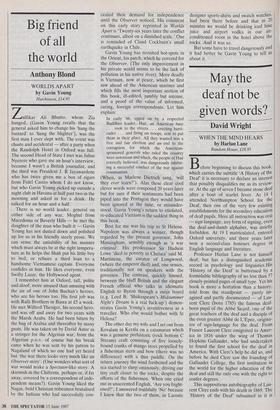Big friend of all the world
Anthony Blond
WORLDS APART by Gavin Young
Hutchinson, f14.95
Zulfikar Ali Bhutto, whom Zia hanged, (Gavin Young recalls that the general asked him to change his 'hang the bastard' to 'hang the blighter'), was the first man I ever slept with. The event was chaste and accidental — after a party when the Randolph Hotel in Oxford was full. The second Head of State I met was Julius Nyerere who gave me an hour's interview, because I wasn't a British journalist, and the third was President J. R Jayawardene who has twice given me a box of cigars from Fidel Castro whom I do not know, but who Gavin Young picked up outside a night club in Havana at half past two in the morning and asked in for a drink. He talked for an hour and a half.
There is no world leader, general on either side of any war, Moghul from Macedonia or Beverly Hills — he met the daughter of the man who built it — Gavin Young has not dusted down and polished up for us in his friendly steely prose. We can sense the amiability of his manner which must always be at the right tempera- ture as he helps the Shah put his little boy to bed, or refuses a third loan to a handsome Vietnamese captain. Everyone confides in him. He likes everyone, even Swifty Lazar, the Hollywood agent.
I remember him at Oxford, tall, polite and aloof, more amused than amusing with the air of one of John Buchan's heroes, who are his heroes too. His first job was with Ralli Brothers in Basra at £5 a week. He met Wilfred Thesiger, his second hero, and was off and away for two years with the Marsh Arabs. He had been bitten by the bug of Arabia and thereafter by many gnats. He was taken on by David Astor as a stringer for the Algerian war, from the Algerian p.o.v. of course but his break came when he was sent by his patron to Nagaland of which no one had yet heard but 'the war there looks very much like an Observer story'. (One wonders what sort of war would make a Spectator-like story. A skirmish in the Chilterns, perhaps or, if far away, covered by a correspondent of inde- pendent means?). Gavin Young liked the Nagas, bold Christian tribesmen brutalised by the Indians who had successfully con-
cealed their demand for independence until the Observer noticed. His comment on this early story reprinted in Worlds Apart is 'Twenty-six years later the conflict continues, albeit on a dimished scale.' One is reminded of Claud Cockburn's small earthquake in Chile.
Gavin Young has revisited hot-spots in the Orient, his patch, which he covered for the Observer. (The only improvement in his private world seems to be the lack of pollution in his native river). More deadly is Vietnam, now at peace, which he first saw ahead of the American marines and which fills the most important section of this book, ill-edited, jumbly but intense, and a proof of the value of informed, caring, foreign correspondents. Let him explain:
In early '66, egged on by a respected Buddhist leader, Hue, an American base . . . took to the streets . . . erecting barri- cades . . . and firing on troops, sent to put them in their place. All they wanted was a free and fair election and an end to the corruption for which the American- sponsored generals who ruled the country were notorious and which, the people of Hue correctly believed, was dangerously inhibit- ing a successful conduct of the war against communism.
(When, as Marlene Dietrich sang, 'will they ever learn?'). Alas these clear cool clever words were composed 20 years later but for sure if their sentiments had been piped into the Pentagon they would have been ignored at the time, or misunder- stood. Gavin Young's return to etiolated, re-educated Vietnam is the saddest thing in this book.
Best for me was his trip to St Helena. Napoleon was always a winner, though regarded by the present governor, John Massingham, sensibly enough as 'a war criminal'. His predecessor Sir Hudson Lowe 'died in poverty in Chelsea' said M. Martineau, the curator of Longwood, (where the emperor died) and, one senses, traditionally not on speakers with the governor. The contrast, quickly limned, between the bluff British and the elegant French official who talks in idiomatic English to Byron through a ouija board (e.g. Lord B: 'Shakespeare's Midsummer Night's Dream is a real fuck-up') demon- strates Gavin Young's inventiveness as a traveller. Who else would bother with St Helena?
The other day my wife and I set out from Kovalam in Kerala on a catamaran which was a genuine prehistoric (rock bottom C Stream) craft consisting of five loosely- bound trunks of mango trees propelled by a fisherman stern and bow (there was no difference) with a thin paddle. On the return journey the wind freshened and the sea started to slurp ominously, driving our tiny craft closer to the rocks, despite the efforts of the fishermen. When one cried out in unaccented English, 'Are you fright- ened?', I answered truthfully 'No' because I knew that the two of them, in Lacoste designer sports-shirts and swatch watches, had been there before and that in 20 minutes we would be drinking iced lime juice and airport vodka in our air- conditioned room in the hotel above the rocks. And it was so.
But some have to travel dangerously and it had better be Gavin Young to tell us about it.



























































 Previous page
Previous page